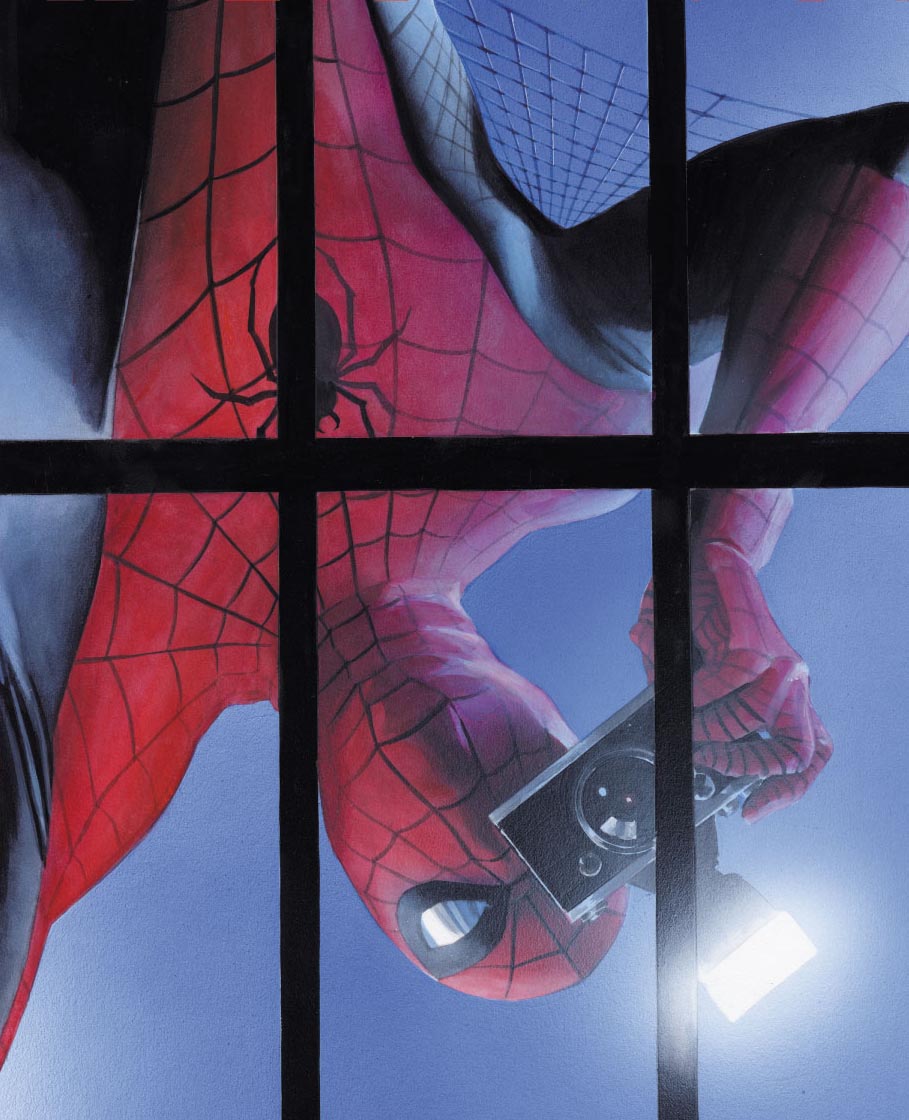 >
>
If you think about it, everyone has a favorite superhero. It could be Superman, with his
patriotic ideals, or Batman, with his code of justice, or Iron Man, with his power and
knowledge used to help fight crime. Through various media adaptations such as movies or
TV shows, superheroes have now hit the mainstream in a big way. But why are superheroes
so popular nowadays, or better yet, what made them popular in the first place? What draws
us to them? Is it their origins? Their stories? What they represent? How they are drawn?
Think about EVERY superhero you have seen in your life. Every comic, every movie, video
game you may have played where a superhero is involved. Now what do all of those heroes
have in common? They are the embodiment of physical perfection. They have good looking
bodies, handsome faces, in some ways most of them are all interchangeable. But why is
this the case? Why so much focus on good looking men? If one were to look at the history
of comic book creators and artists, you would realize that most writers and artists have
all been men. I bring this up because I find it funny that there would be this focus on
male masculinity.

Now to be fair, most comic books in the past have not had this focus on the male form.
But during 70's and onwards, you start noticing this trend of superheroes and their more
masculine forms. The answer may lie within the idea of the masculine and homoerotic gaze.
In Patrick Schuckmann's article, Masculinity, the Male Spectator and the Homoerotic Gaze,
he writes about the action hero archetype, which fits into the discussion of the superhero.
He states "The action genre's construction of eroticized masculinity seems to constitute a
highly contradictory and explosive situation, in which scenarios of violence and aggression
prevail, in which homosexuality has to be constantly invoked as well as disavowed.... At the
same time, the location of the erotic male image in a context of heterosexual masculinity
serves to establish the homoerotic gaze as a secretive source of pleasure for the male
spectator. (Schuckmann 677)" Yvonne Tasker argues in her study of the genre, Spectacular Bodies (1993),
that in a certain sense, the muscular action-film hero merely performs the masculine "by
acting out an excessive caricature of cultural expectations. (Tasker 78)" Superheroes,
like action stars, are required to have a certain physique and act in certain masculine ways.
It seems as if artists started making sure that the readers could better see the physical
shape of their heroes, especially with the use of spandex costumes or light armor. The
idea of the superhero gaze could potentially fit in with the idea of the homoerotic gaze,
but to assume all comic book readers are secretly turned on by the buff superhero would be a
false accusation (but then again, some probably are).
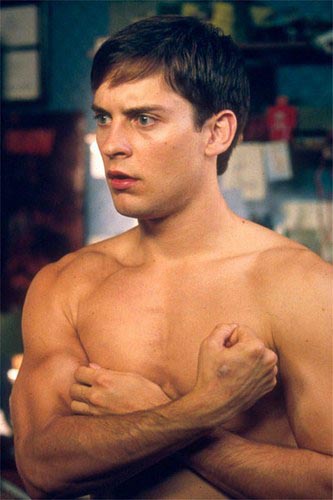
But again, why such focus? Why are they drawn so masculine? One could argue that superheroes
are athletes, and that based on their constant fighting, and the training that they went
through to become superheroes in the first place, that this made them into the strong men
you see on the comic book page, and it is only logical they be drawn this way. But what
about the comic book characters who weren't trained, or have a superpower that doesn't necessitate
strenuous workout, and yet, they are still so buff? Characters like Ant-Man or Mr. Fantastic
of the Fantastic Four were just scientists who had no training of any kind. Yet through
some freak accident, they are now superheroes with random powers, and apparently, one of
those powers is to obtain six-pack abs.
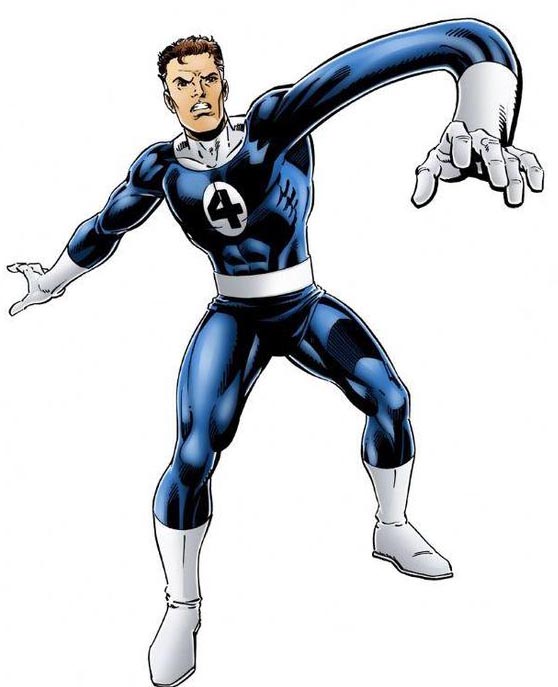 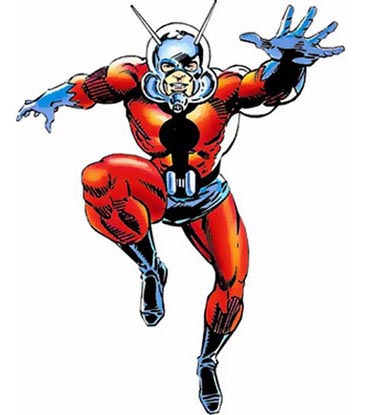
|
So why DO artists draw their superheroes to be so strong and masculine? There are many
reasons, but particular reason would be how viewers would choose to identify with their
heroes. When we view superheroes, we see what is supposed to be the fantastical, and the
embodiment of perfection. Avid comic book readers look to superheroes for inspiration and
guidance. When they see a superhero, they picture themselves as that hero. Because of that,
superheroes must be good looking, for the reader himself wants to be good looking. We see
ourselves as that hero. We want to save the day, rescue the damsel in distress. Be the
nerdy hero who STILL gets the supermodel girlfriend, despite being nerdy. So when we imagine
ourselves as heroes, we would like to see ourselves look the part. However, superheroes
have often been exaggerated in their proportions over time. Rob Liefeld, a well-known comic
book artist, has been notorious for often exaggerated drawings of male superheroes. With
chiseled faces, large, unnatural chests, and small feet, we see another look into the animation
of superheroes. His view on the idea of the comic hero has drawn vast amounts of criticism
from those in the comic book community. But these are superheroes. They are not meant to be
realistic. |

|
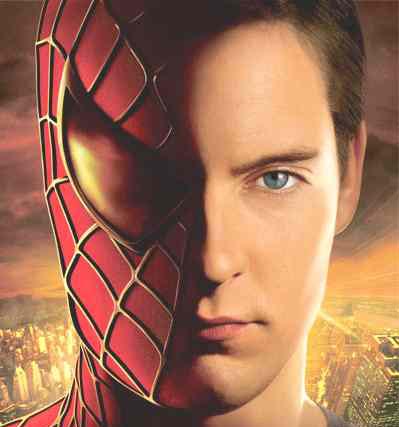
|
Is the argument being made by fans that they want the superheroes looking good, but that a
level of believability is required in order for them to be taken seriously? As Danny Fingeroth
claims in his book, Superman on the Couch, "In the frenzy to get closer to some simulation of
realism, perhaps an important part of the superhero fantasy is lost. The fantasy is a large
part of what draws people to these heroes in the first place (Fingeroth 60)." It plays into
the idea of duality. All of these characters have these weaker alter-egos. Superman has
Clark Kent, a mild-mannered journalist, or Spiderman has Peter Parker, a nerdy photographer.
The idea of their secret identity appeals to the fantasy of the comic book fan, as to
them, anybody could secretly be a hero. We view these heroes from afar, through the lenses
of a comic, enjoying their every move.
|
|
Because of this, I believe, we require in some regard, that our heroes be better looking than we are.
Not to say that the reader can't ever become good looking. But think about the average reader and
what they look like. It might seem wrong to stereotype the typical comic book fan as
overweight/underweight and not good looking. But having been to some conventions, and having
gone to some comic book shops, it's very rare to meet an individual who is as good looking
as a comic book character. Not to say it has never happened, but again, it is extremely rare.
Also, what's inspirational about a fat, ugly superhero [they exist, but are often joke
characters, whose appearance is often laughed at and mocked, though on occasion can be quite
powerful (The Sentry)]?
|
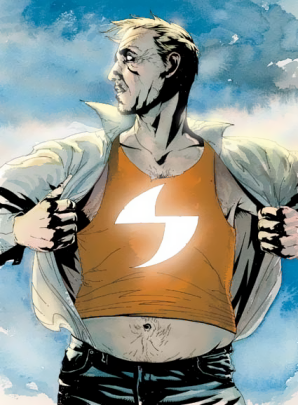
|
An interesting aspect to the alter-ego however, is how they are portrayed. In the case of
Clark Kent, Superman is the real man, and Clark Kent is the actual mask, the facade that
Superman pulls off in public. Jules Feiffer comments in The Great Comic Book Heroes, that
Superman's bumbling and klutzy alter-ego Clark Kent is Superman projecting his own image
of the average American male (Feiffer 347-349). Another aspect of the superhero gaze is
that they represent almost something otherworldly as well. Though they are meant to be
identifiable, with all superheroes having some sort of crisis we, the reader can identify
with, there are also aspects of themselves that don't fit into our lives. We can compare
the superheroes to the Greek Gods of the past, and their myths. Humankind has a need for
myth, and mythological heroes are expressions of that elemental need. As Rollo May says
in The Cry for Myth, "a hero is a myth in action (May)." In that case, one could argue
for the case that superheroes are a necessity in today's age. They are gods amongst men,
and titans of the new age. They fight the fights that must be fought, and uphold and
protect the laws. As Richard Reynolds claims in his book Super Heroes, a Modern Mythology, "The
superhero has a mission to preserve society, not to re-invent it. (Reynolds 77)"
This draws into Roland Barthes studies on myths and ideologies, and how our older society
used superheroes as a means to expressing dominant older values (Rose 131-32). Indeed, one
could make the argument that the superhero is meant to preserve the old ways of truth and
justice. Like the gods before them, they were heroes of their time. Myths on the comic book
page. But these morals are not the only reason people would read comics. If that were the
case, we would still be stuck in the early Golden Age (pre-World War II) and Silver Age
(1950's to 70's) of comics; with characters babbling off about what is right and wrong
like a badly written PSA. The true success of the comics lies in the characters, and what
makes them identifiable to our culture. I've talked about the way we view the comic
characters, in terms of appearance. But comic book characters are far more than appearance,
and more often than not, represent something far deeper in our culture that needs to be
addressed.

Click the forward arrow to continue reading, or the back arrow to head back home.


|
 >
>









